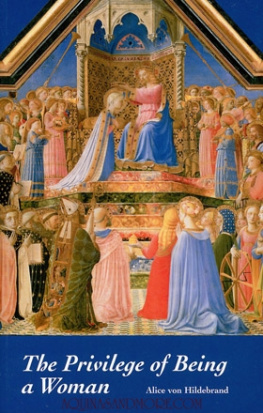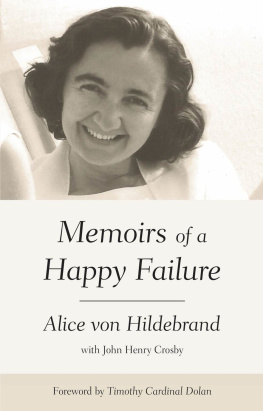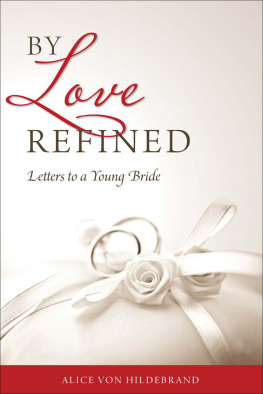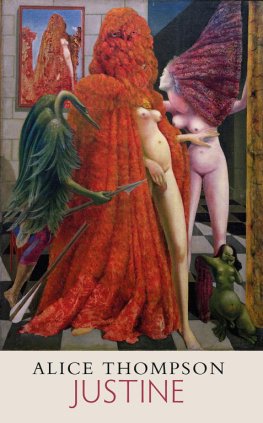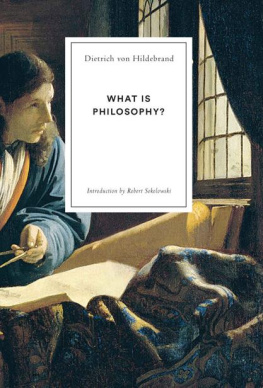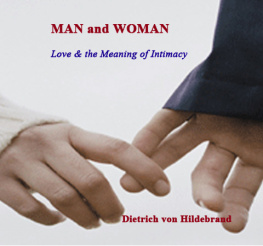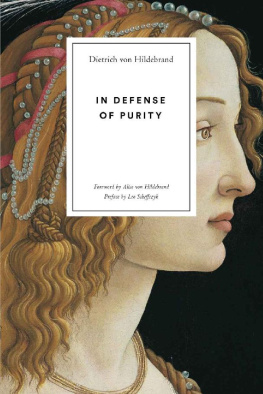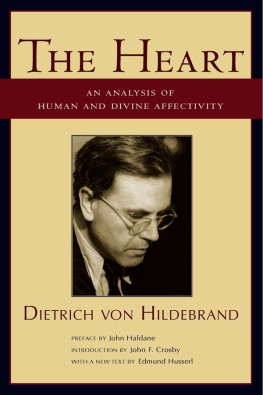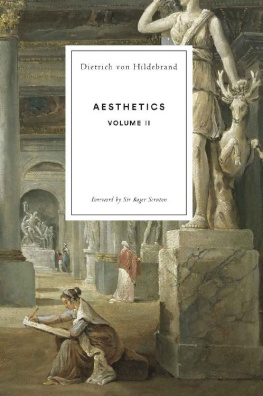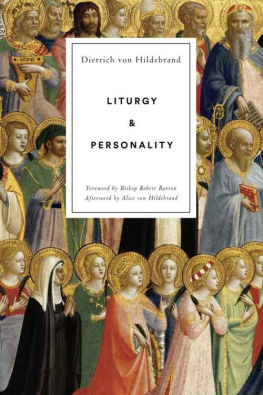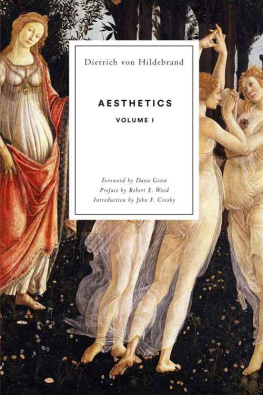The Privilege of Being a Woman
ALICE VON HILDEBRAND
Sapientia Press of Ave Maria University
Dedicated with loving gratitude to my dear friends who alllove to be women:
Alice Ann Grayson, Barbara Henkels , Joanie Smith, Wendy Teichert , and Rose Grimm Teichert
CONTENTS
PART I
Arguments Against the Privilegeof Being a Woman
SECULARARGUMENTS
How can it be a privilege for a woman to becalled "the second sex" ( sexus sequior ); to be considered less talented, lessstrong, less creative, less interesting, less intelligent, less artistic thanher male counterpart?
All great creations of mankind have been made bymen: in architecture, in fine arts, in theology, in philosophy, in science, intechnology. The history of the world is mostly the history of the achievementsof human males; from time to time, a female is mentioned, but she is thencommended for her "manly" qualities, or for having "a virilemind." Simone de Beauvoir and SimoneWeil are frequently praised for this same reason. On the other hand, we lookdown upon someone who is designated as "effeminate" or"womanish."
According to statistics, most people prefer tohave a boy baby than to have a girl. This is true not only in societies like China , wheretraditionally girls have been abandoned and even murdered. Today one millionsix hundred thousand baby girls are abandoned. More femalethan male babies are aborted. Not long ago, the NewYork Times reported that in Korea women feel guilty toward their husbands when they produce "only"girls. They do not seem to know that, biologically speaking, it is the male who determines the sex of the child!
Who would choose to have a body which, from thetime of puberty on, can be burdensome, can cause discomfort and even severepain? Who would choose to be nauseated for weeks, and sometimes months, duringpregnancy? Who would choose to give birth in agonizing pain? When the OldTestament wishes to illustrate severe trials, it usually refers to a woman inlabor.
Men want women to exist, but they do not want tobe women themselves. Simone de Beauvoir writes that"...men are human beings; women are just females." She claims thatwomen cannot transcend, and that they "produce nothing. Women are"pure objects" who exist in order to satisfy the cravings of the malesex. According to her, women are "disgusted by their own sex." Theyloathe being women. This is what G. K. Chesterton had in mind when he wrotethat a feminist is someone who "dislikes the chief femininecharacteristics." As a result, the agenda of feminists, whileanimated by a hatred of men, aims at virilizing womenso that they can gain control over their bodies, their destiny. Once liberatedfrom biological ties, women will be able to develop their talents which, forcenturies, have been crushed by social taboos. According to de Beauvoir , the scarcity of female accomplishments is to beexplained "by the general mediocrity of their situation..."
The leading feminists encourage their disciplesto become masters of their destiny instead of being subject to a quirk ofnature. They must liberate themselves and become "free." In order toachieve this aim, feminists proclaim the identity of men and women. The wiserChesterton wrote, "There is nothing so certain to lead to inequality asidentity."
Bluntly speaking, women have traditionally beenconsidered "inferior" to men. This is the dictate of nature:"Anatomy is destiny." To plead their cause, feminist scholars havebeen efficient at unearthing nasty things that men have said or written aboutwomen. That many famous men have spoken disparagingly of women cannot bedenied. Aristotle refers to females as "deficient males." In the OldTestament there are numerous statements about women that are far fromcomplimentary. Some deserve to be quoted: "Any wickedness but not thewickedness of a wife." "I would rather dwell with a lion and a dragonthan dwell with an evil wife." "From a woman sin had its beginning,and because of her we all die." "An evil wife is an ox yoke whichchafes; taking hold of her is like grasping a scorpion." "It is awoman who brings shame and disgrace." "One man among a thousand Ifound, but a woman among all these I have not found." "Aman who wishes you ill is better than a woman who wishes you well."
The Torah does not speak favorably of a woman'sintellect: "Rather burn Torah than try to explain it to a woman."Some Fathers of the Church follow suit. The great Saint John Chrysostom wrote:"Among all wild beasts, there is none to be found which is more harmfulthan the woman." According to Luther, the meaning of a woman's life is to procreate:"the work and word of God tell us clearly that women must be used formarriage or for prostitution. If women get tired and die of bearing, there isno harm in that: let them die so long as they bear: they are made forthat."
The secularist view is hardly more flattering. InHamlet, William Shakespeare wrote the often-quoted words: "Frailty,thy name is woman." John Milton writes that "the woman isa pretty mistake." (What should be said, we might ask, of a woman who isnot pretty?) Kantin one of his "humble" moodswrites that "thewoman is less talented, morally inferior to man." With Teutonic brutalityFriedrich Nietzsche writes, "When you go to a woman, do not forget yourwhip." Arthur Schopenhauer speaks of women with contempt: "Women arechildish, frivolous and shortsighted ... big children all their lifelong." With sarcasm and wit, he gives vent to his intense dislike of hismother. His essay on women is a long litany of negative female attributes. Notonly does he despise a woman's intellect, but he even objects to calling women"the fair sex." According to him, women are "the unaestheticsex."
Alexandre Dumas writesthat "According to the Bible, woman was the last thing God made. It musthave been a Saturday [sic] night: clearly he was tired." Lord Byronlaments the fact that whereas men cannot stand women, they cannot live withoutthem. A German thinker, today totally forgotten, by the name of Weininger , made headlines by writing that "women'sminds are pure nonsense." His book was reprinted twenty-five times.Sigmund Freud made the interesting "scientific" discovery that everylittle girl is born with "penis envy," which is long before she couldpossibly know that this organ exists.
Yet feminists carefully refrain from mentioningthe beautiful statements that men have made throughout history such as"she [a good wife] is far more precious than jewels;" or "do notdeprive yourself of a wise and good wife; for hercharm is worth more than gold." Dante sings the praise of the donna angelicata (woman viewed as an angel). He immortalizedBeatrice, his one great love, whose personality is a light and an inspirationin the poet's life, and whose mission is to lead him to God. Shakespeare'sfemale characters are often sublime. Lamartine refersto women as " anges mortels , creation divine" ("mortal angels,divine creation"). Schiller rhapsodizes about the female sex. Theodor Haecker claims thatnature made woman more perfect than man because she is more inclined to loveand to give herself. The noblest characters in Claudel's plays are women (e.g., Violaine , Sygne ).Forced to face this truth, de Beauvoir interprets itin her feminist way. She writes: "But if his women [ Claudel's ]are thus remarkably devoted to the heroism of sanctity, it is above all because Claudel still views them in a masculineperspective." As sanctity is devalued in de Beauvoir's eyes (as a poor substitute for great achievements), the highest praise that canbe given anyone male or female namely holinessis, to her mind, only a left-handedcompliment.
That such divergent statements can be made aboutwomen can find sundry explanations. It is usually true that an impure man, orone hooked on pornography, will look down upon women. On the other hand, a mansteeped in the supernatural will look up to the sex that was honored to givebirth to the Savior of the world. In the end, unwarranted generalizations aretypical of shallow minds. That some women are "big children their wholelife long," that some women are refinedly wicked, that some are stupid, and so on are as dull as statements claiming thatsome men are bestial, some are brutal, some are stupid (because stupidity,against which the gods themselves fight in vain, is pretty fairly distributedbetween the two sexes).
Next page
